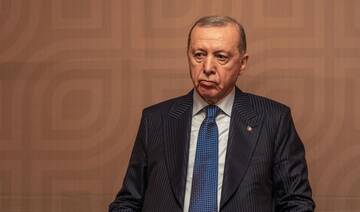NAFPLIO, Greece: A group of Egyptians jailed for nearly a year pending trial for a deadly shipwreck were released from jail Wednesday, a day after a Greek court threw out the case against them on grounds that it had no jurisdiction to try it.
Nine Egyptians had been charged with being part of the crew of the Adriana, a massively overcrowded trawler that capsized and sank near Greece last June with an estimated 700 people on board while sailing from Libya to Italy. Only 104 people survived – all men, mostly from Syria, Egypt and Pakistan — and 82 bodies were recovered.
The nine, who have been in pretrial custody since their rescue last year, had been charged with being members of a migrant smuggling ring and were accused of having caused the shipwreck. They had faced several life sentences if convicted.
But a court in the southern Greek city of Kalamata on Tuesday ruled it had no jurisdiction to try the case, as the shipwreck occurred in international waters, none of those involved had been trying to enter Greece, the ship was not Greek flagged and no Greek citizens were on board.
The Egyptians’ defense team had argued that the nine were not crew members of the ill-fated trawler but had been paying passengers who were mistakenly identified as crew by nine other survivors, and that they were being used as scapegoats by authorities eager to put all the blame for the tragedy on the trawler’s crew.
Eight of the nine were released from a jail outside the southern city of Nafplio on Wednesday evening. They were transferred to a police station in the city, where they were to remain in custody overnight pending further procedures. It was not immediately clear when they would be fully released from custody.
The ninth defendant was to be released from a different jail.
The massive loss of life in the sinking of the Adriana in the early hours of June 14, 2023, renewed pressure on European governments to protect the lives of migrants and asylum seekers trying to reach the continent. The European border protection agency Frontex says illegal border detections at EU frontiers increased for three consecutive years through 2023, reaching the highest level since the 2015-2016 migration crisis, driven largely by arrivals by sea.
The exact circumstances of how the Adriana sank remain unclear. The trawler was sailing in international waters but within Greece’s search and rescue area of operations, and a coast guard patrol boat and passing merchant ships were near the vessel for several hours. Greek authorities have said the trawler’s crew repeatedly refused offers of help, insisting it wanted to continue to Italy.
Several survivors have said the boat capsized after the Greek coast guard attempted to tow it, an accusation Greek authorities have vehemently denied. A Naval Court investigation into the sinking is still underway.
Speaking at the courthouse after the case was dismissed on Tuesday, Dimitris Choulis, one of the lawyers in the defense team for the nine Egyptians, said attention should turn to how the Adriana sank.
“The court today had to be very brave to issue this decision, and to say that these people are not the smugglers,” Choulis said.
The lawyer blamed the tragedy on the Greek coast guard and Europe’s migration policies, and said it was essential to “make sure that nothing like that would happen again.”
Egyptians held nearly a year over deadly shipwreck are released from Greek jail after case dismissed
https://arab.news/zq4ew
Egyptians held nearly a year over deadly shipwreck are released from Greek jail after case dismissed

- The Egyptians’ defense team had argued that the nine were not crew members of the ill-fated trawler
- Eight of the nine were released from a jail outside the southern city of Nafplio on Wednesday evening
Turkiye seals preliminary deals for largest foreign-funded railway project

- The funding will support the 125 km (78 mile) long Northern Ring Railway Project, which will carry passengers and freight from Gebze to Halkali via the Yavuz Sultan Selim Bridge connecting Istanbul’s two main airports
ISTANBUL: Turkiye has reached preliminary agreements with six international lenders to secure $6.75 billion for a new railway line across the Bosphorus in what would be Turkiye’s largest foreign-financed railway project, Transport Minister Abdulkadir Uraloglu said on Tuesday.
Once completed, the line that will pass through north Istanbul is expected to carry 33 million passengers and 30 million tons of freight annually, he said, adding that it will open “a new era in logistics” by boosting the country’s rail capacity between Asia and Europe.
The funding will support the 125 km (78 mile) long Northern Ring Railway Project, which will carry passengers and freight from Gebze to Halkali via the Yavuz Sultan Selim Bridge connecting Istanbul’s two main airports.
Preliminary deals were reached with the World Bank, Asian Infrastructure Investment Bank, Asian Development Bank, Islamic Development Bank, OPEC Fund for International Development and the European Bank for Reconstruction and Development, the minister said.
“We aim to complete the tender process and hand over the site this year so that (construction) work can start,” Uraloglu said.
An uninterrupted rail freight across the Bosphorus Strait is currently possible through the Marmaray railway tunnel and only during limited hours daily. According to the ministry’s website, a total of just 1.7 million tons of cargo were transported through Marmaray between 2020 and October 2025.














